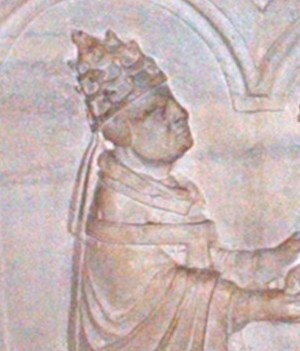
Pope Urban VI
Pope Urban VI (Latin: Urbanus VI; Italian: Urbano VI; c. 1318 – 15 October 1389), born Bartolomeo Prignano (Italian pronunciation: [bartoloˈmɛːo priɲˈɲaːno]), was head of the Catholic Church from 8 April 1378 to his death, in October 1389. He was the most recent pope to be elected from outside the College of Cardinals. His pontificate began shortly after the end of the Avignon Papacy. It was marked by immense conflict between rival factions as apart of the Western Schism, with much of Europe, such as France, the Iberian Kingdoms of Castile and Aragon, and Scotland recognizing Clement VII, based in Avignon, as the true pope.
Urban VI
8 April 1378
15 October 1389
Avignon claimant:
Clement VII
21 March 1364
15 October 1389 (aged 70–71)
Rome, Papal States
Your Holiness
Holy Father
None
Early life[edit]
Born in Itri, then part of the Kingdom of Naples, Prignano was a devout monk and learned casuist, trained at Avignon. On 21 March 1364 he was consecrated Archbishop of Acerenza in the Kingdom of Naples. He became Archbishop of Bari in 1377.[1]
Prignano had developed a reputation for simplicity and frugality and a head for business when acting vice-chancellor. He also demonstrated a penchant for learning, and, according to Cristoforo di Piacenza,[2] he had no family allies in an age of nepotism, although once in the papal chair he elevated four cardinal-nephews and sought to place one of them in control of Naples. His great faults undid his virtues: Ludwig von Pastor summed up his character: "He lacked Christian gentleness and charity. He was naturally arbitrary and extremely violent and imprudent, and when he came to deal with the burning ecclesiastical question of the day, that of reform, the consequences were disastrous."[3]
